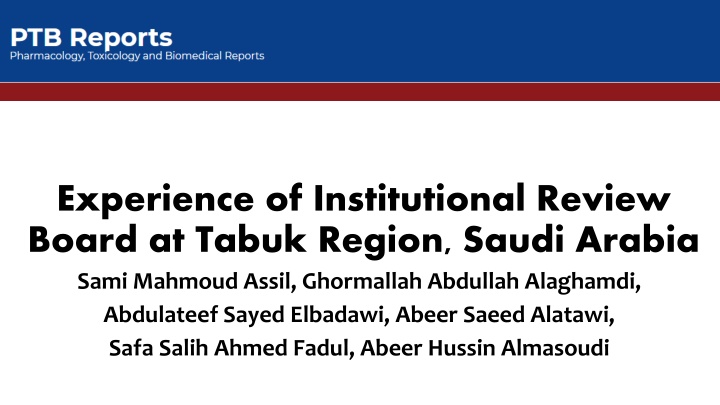
Exploring Institutional Review Board Experiences in Tabuk, Saudi Arabia
Discover the insights from the Institutional Review Board in Tabuk, Saudi Arabia, focusing on research proposals submitted, approval rates, factors influencing decision-making, and implications for regional clinical research policies and procedures.
Download Presentation

Please find below an Image/Link to download the presentation.
The content on the website is provided AS IS for your information and personal use only. It may not be sold, licensed, or shared on other websites without obtaining consent from the author. If you encounter any issues during the download, it is possible that the publisher has removed the file from their server.
You are allowed to download the files provided on this website for personal or commercial use, subject to the condition that they are used lawfully. All files are the property of their respective owners.
The content on the website is provided AS IS for your information and personal use only. It may not be sold, licensed, or shared on other websites without obtaining consent from the author.
E N D
Presentation Transcript
Experience of Institutional Review Board at Tabuk Region, Saudi Arabia Sami Mahmoud Assil, Ghormallah Abdullah Alaghamdi, Abdulateef Sayed Elbadawi, Abeer Saeed Alatawi, Safa Salih Ahmed Fadul, Abeer Hussin Almasoudi
Objectives: The Institutional Review Board is the essential committee at healthcare facilities that protects the patient from risk-related factors before, during, and after clinical research. The current investigation aims to explore the regional committee s local experiences. Materials and Methods: A retrospective review design was used. This study included all research proposals submitted for the IRB during 2022-2023. A restructured data tool was used. It consisted of two parts. The first part contained general information about the research proposal. The 2nd part included the items on the checklist that were used to evaluate the research proposals.
Results: IRB received 124 proposals during the study period. The majority of research was submitted from outside MOH facilities 121 (97.6%) and conducted in the medical or surgical fields 46 (57%) at healthcare facilities 116 (93.5%), with universityaffiliated 91 (73.4%). Most of the research designs proposed were cross- sectional 104 (83.9%), with a low percentage of randomized controlled studies 3 (2.4%). Most of participants authorship were multiple 102 (82.3%) with students sharing 85 (68.5%), academic proposal 91 (73.4%) with academic supportive 73 (59%). Among the proposals submitted to IRB, most of them were approved 109 (87.9%) and needed single 56 (45.2%) or double revision 43 (38%). The faith of researches submitted was data collection process 47 (37.9%), and published 31 (25%) or under publication 25 (20.2%). The average time for proposal approval was 35.37+/-83.447 days. The multiple linear regression analysis confirmed that the Number of reviews explained 32.4% of the positive relationship to the variation in approval time, with a statistically significant difference (p=0.000). The relationship between decision-making and all checklist items as factors affecting decision-making: All checklist items were not statistically significant (p>0.05) except the proposal title, data analysis plan (p=0.014), and ethical consideration (p=0.012). Conclusion: The regional Institutional Review Board committee addresses certain aspects of the research proposal to influence positive outcomes. They provide valuable information to update the regional clinical research policy and procedures.
KEYWORDS Institutional Review Board, Research Proposals, Saudi Arabia, Tabuk.
Most researchers excel at crafting comprehensive research proposals, with over two-thirds demonstrating proficiency in all components. This reflects a commendable skill level among researchers in proposal writing. However, some could benefit from additional training in research methodology to further enhance their abilities. These findings emphasize the importance of addressing specific aspects of research proposals to positively influence decision outcomes. Understanding these factors can help researchers and decision-makers improve the decision- making process within the academic community. These results offer valuable guidance for navigating and enhancing decision processes in research endeavors.
